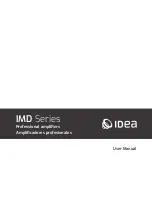
37
Operating Manual - nX, nXe, and nXp Power Amplifiers
Bessel
These filters, as implemented in Ashly's NE devices, are always -3dB at the displayed crossover frequency. Bessel
filters have a maximally flat group delay. Stated another way, Bessel filters have the most linear phase response. When a Bessel
HPF and LPF of the same corner frequency are summed, the combined response is +3dB for 12dB/oct, 18dB/oct, and 48dB/oct
Bessel filters, and -2dB for 24dB/oct Bessel filters. One of the outputs may need to be inverted when using either 12dB/oct or
18dB/oct Bessel HPF and LPF's to create a crossover to compensate for the phase shift of the filter.
Linkwitz-Riley
The 12 dB/oct, 24dB/oct, an 48dB/oct Linkwitz-Riley filters individually are always -6dB at the displayed corner
frequency, however the 18dB/oct Linkwitz-Riley filters individually are always -3dB at the displayed corner frequency. The
reason for this is that Linkwitz-Riley filters are defined in terms the summing of two adjacent HPF and LPF filters when used
in a crossover, rather than defined in terms of the pole-zero characteristics of individual filters. The 18dB/oct Linkwitz-Riley
individually are 18dB/oct Butterworth filters in that they have Butterworth pole-zero characteristics and also satisfy the criterion
for Linkwitz-Riley filters. When a Linkwitz-Riley HPF and LPF of the same corner frequency are summed, the combined re-
sponse is always flat. With 12dB/oct Linkwitz-Riley crossover filters, one of the outputs must be inverted or else the combined
response will have a large notch at the crossover frequency.
Crossover Notes
When used in a crossover, filter type will affect the way adjacent pass-bands interact near the crossover point. When
electrically summed, 24dB/octave Linkwitz-Riley filters produce a flat transition through the crossover region, assuming that
the HPF and LPF are set to the same corner frequency. This makes 24 dB/octave Linkwitz-Riley filters quite popular. However,
crossover filter types must be carefully selected to match the acoustic response of the specific loudspeaker system. Please consult
the manufacturer of the loudspeaker system for recommended crossover frequencies and filter types.
HPF and LPF filters
HPF and LPF are single ended filters similar to crossover filters, and are available on inputs and outputs.
















































